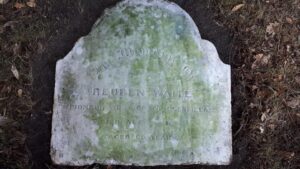1864: The Waite
July 22, 2024
By AHNZ
 Today in New Zealand history, 22 July, 1864, pioneer storekeeper and entrepreneur Reuben Waite (1823-1885) landed and set up shop at at Greymouth. This moment was the key event in opening up an unwanted, remote, country which very soon became the most prosperous and wealthy part of all New Zealand.
Today in New Zealand history, 22 July, 1864, pioneer storekeeper and entrepreneur Reuben Waite (1823-1885) landed and set up shop at at Greymouth. This moment was the key event in opening up an unwanted, remote, country which very soon became the most prosperous and wealthy part of all New Zealand.
Before The Waite charted the SS Nelson for this prospecting expedition others had dabbled with the rich deposits of gold and coal on The West Coast. However, it had been left up to a man of vision to shoulder the weight of risk and disbelief with his own money and life on the line to make the first move.
Waite chartered the first steamship to ever make it to this ‘port’. He re-established the store that government (Canterbury Provincial Council (CPC)) had abandoned, he set up supply lines and shipped out exquisite Brunner coal and Taramakau gold thus creating an industry to employ many thousands of diggers and support industries. Waite and his wife brought horse, mule, and bullock to the Coast. And, out of affection and/or a storeman’s practicality, the first cats. Waite landed with 10 of the same on Day 1.
Waite opened up the territory presided over by Canterbury and Nelson but which both provinces had turned their backs on as a rejected “Outlandish Country.” Within 10 years Westland would secede to become their own province (22 August, 1873.)
Waite was vindicated but it was not an easy road. He was soon joined by his brother-in-law Issac Blake who would take over the store and found his own, Blaketown, which is now a suburb of Greymouth. Within weeks the area was flooded with diggers abandoning the old Otago diggings by land and Victorian diggings by sea. By 10 December a Bank of New Zealand branch was open for business in Greymouth.
The development of the West Coast was achieved without government and in spite of it due to the spontaneous commercial action of daring men like Waite.
Reuben Waite Before Greymouth
The sources have little to tell about Reuben Waite’s life before New Zealand. The jovial Englishman was not a Nelsonian but seen by them as a “madman from Victoria.” Ref. A Narrative of the Discovery of the West Coast Gold-Fields, Waite (1869,) wikisource.org
According to O’Regan (1928,) who knew Waite in his own childhood, the pioneer had started out in the stonemason’s trade. Waite says himself he knew the California goldfields¹ before moving on to the Australia. From Nelson he became “the moving spirit” of a number of Victorians keen to open up the West Coast wilderness. Nelson Province, just like Otago and Canterbury, found this sort of thing disruptive to the kind of colonial economy they thought they could dictate. Waite had to fight the “madman” moniker and the local insistence that South Nelson/West Canterbury was “Outlandish Country.”
As we have seen, Otago’s Presbyterian Utopia was disrupted without consent when Gabriel Read struck payable gold. Ref. 1861: The Invasion of Otago, AHNZ
Canterbury’s Anglican Utopia responded the same way to outsiders enriching their province. The CPC had recalled Reuben Waite’s state-sponsored predecessor, William Revell, who was during this time trying to convince his superiors what fools they were being. The editorial of the Lyttelton Times (probably authored by Charles Bowen then) flat out stated that West Coast’s gold, timber, and coal wasn’t worth bothering with. That, the best use for the place would be as an inhospitable penal colony where “slave-labour” would be directed to build an hospitable place to trap itself. Ref. Lyttelton Times (7 April, 1864,) Papers Past
Waite kept stores at Collingwood during the rush that renamed Able Tasman’s Massacre Bay to Golden Bay. When this field was tapped out he led the way in answering the call to develop the future Westport. Maoris were always in the thick of it and were so anxious for Waite to come and supply them that they called the river there ‘Come-On-Waite’ which in their language is written Orawaiti River. This information, it must be noted, comes from Waite himself who was a great joker by nature and this may be one of them. However, I’m quite prepared to believe him.
“Waite was a well-known figure…I knew Mr. and Mrs Waite personally…he entertained a party of merrymakers with an exhibition of bentriloquism, of which he was no mean exponent. He was a man who, even in his later days, was given to practical jokes and humorous anecdotes. Indeed, his usual manner was rather flippant..as a result was never taken as seriously as he deserved to be.” – O’Regan (1928)
“We arrived off the Buller in two days. When we entered at high water, we found three and a-half fathoms on the bar. We had not long been there before I sold all my goods for gold to the Maoris. It appeared that a lot of the Collingwood natives, knowing that I was going to take round provisions, started overland with two white men, and were at the Buller when we arrived with the vessel. They were catching fish and gathering pipis, on the first river north of the Buller, named by them at the time Orawaiti, meaning, “Come on, Waite,” because they could see the vessel approaching, and were in want of provisions.” – A Narrative of the Discovery of the West Coast Gold-Fields, Waite (1869)
“But such is the world, more especially the Nelson world, where in striving to pick up a penny, they invariably drop a sovereign. Greedy to a fault, but unwilling to expend that which is necessary for the advancement of the place, they lose the golden opportunity, which for years may not again come within their reach, and then for ever pine over that which might have been accomplished but for the niggardly save-all propensities of their ruling powers. I do not by this mean to brand all the community, but only some, who if they would look to higher ends might attain a loftier position in the opinion of their fellow men than that which they now hold….I have written it to show through what penny-wise and pound-foolish ways Nelson has been brought to what it is, instead of being, what it ought to be, the grand emporium for the West Coast. But I suppose in the course of time the people of Nelson will become awake to the fact, that they must do something for the country, and not expect (as has hitherto been the case) that the country will do everything for them. Many other places have suffered severely through neglecting to take advantage of the golden opportunity when it offered itself, and doubtless Nelson will pass through the same fiery ordeal, to suddenly awake a fresh and different place.” – ibid

It was early in 1863 that Maoris came to Waite at Westport to from the Grey to show their gold and persuaded him to bring a trading post. While making preparations a letter came to him from Chief Thomas Freeman (Tamati Pirimona Marino) and another from John Rochfort urging him to hurry as his services were needed. Leading up to this, for want of shipping, Waite had to walk overland from Buller to Nelson laden with his gold purchase. The opening up of the Grey goldfields, and those beyond, depended on Waite’s effort to arrive safely with his payload.
Using his own money and organising skills, the entrepreneur now charted the SS Nelson for a prospecting expedition. Waite had the tools and provisions and 70 prospectors on board relying on his planning and stores. These were so many that there was standing room only and no place to sleep! Those who tried were the objects of fun which Waite evidently enjoyed and probably masterminded. From Buller, Issac Blake had set out with a further 40 men who would arrive at Grey River just a day after.
Upon arrival the jokes started to dry up. The men paid their money for provisions and equipment to go gold-hunting and Waite didn’t see them again for a week. Mawhera Pa itself was devoid of Maoris except for women and children. Waite’s 100+ men set out to find the Maori men’s diggings and join in. Unfortunately for Reuben Waite they would return from the Taramakau having found nothing and nobody and looking for somebody to blame for this misfortune.
How Reuban Waite Avoided A Lynching
Waite and his 10 cats were more or less all alone for the first week. The diggers had gone gold-seeking after the Maori men, the SS Nelson was off, and Matthew Batty away up the Grey river to bring back coal. Ref. 1864: Coal on the Coast, AHNZ
 Batty and his workers returned first and warmed the winter camp with a huge coal bonfire. Next, the Maori men finally made their appearance and sold to Waite “the finest gold I have ever seen.” However, they came with a warning. They had disguised the track to the Greenstone gold strike so well that the newcomers hadn’t found their way! Frustration at knocking about turning over rocks in the lower Taramakau River had become rage and these 110 men were on their way to avenge themselves on the Greymouth storekeeper.
Batty and his workers returned first and warmed the winter camp with a huge coal bonfire. Next, the Maori men finally made their appearance and sold to Waite “the finest gold I have ever seen.” However, they came with a warning. They had disguised the track to the Greenstone gold strike so well that the newcomers hadn’t found their way! Frustration at knocking about turning over rocks in the lower Taramakau River had become rage and these 110 men were on their way to avenge themselves on the Greymouth storekeeper.
This was a problem of the Maori’s making and they rightly warned Waite in advance and didn’t leave him unprotected.
“I went to the fire, a large one, which, by-the-by, was being fed by coals that had been brought down the river for the Nelson Government. It was rather an exciting moment as, stepping outside the store, the thought struck me that my life hung as it were upon a thread—that the weight of a feather would probably turn the scale either way. I was there standing accused, though wrongfully, of having wilfully brought a number of my fellow-countrymen to an outlandish district, probably to suffer want and ruin. I knew that nothing but self-possession would avail me, so I made the most of my position, and put my trust in Providence. I shall never forget the impression of that scene as it first met my gaze; the bright glare of the huge coal-fire, the motley group of roughly-attired figures around it—some silent and thoughtful, others fierce and clamorous, with every species of anger and revenge visible on their countenances—the solemn and monotonous roar of the distant breakers, together with the surrounding mountain scenery in all its pristine grandeur, formed a romantic picture, rude and wild in the extreme. There were a great many men round the fire waiting for me, and when I made my appearance they began to ask questions of me.”- Waite
Leader of the would be lynching mob, a Dutchman, said “Vel, poys, ve vill take vot ve vants from Vait’s store an’ ve vill hang him!”
Waite’s supporters kept the agitated accusers of making good on their threats. Those who had decided this was a “duffer rush” returned their equipment and got their money back. Only later did a subset of diggers find the diggings at Greenstone- later the town of the same name- and the gold start to flow. The doubters were astonished and had to buy back their equipment at a penalty rate! “From that time commenced the great rush to the Golden West Coast..” writes Waite.
The world was now at the feet of Waite and the Maoris who had set these wheels in motion yet by the end of his life the great entrepreneur is reported to have been hard up. O’Regan put this down to the raconteur in him forming a glass ceiling holding him back from being a leading burgher or even statesman. The same larrikinism that facilitated feats of great endurance, doubt, criticism and loss (eg £1,000 in stock while trying to establish Hokitika goldfields) checked further upward mobility.
“Gently blew the grime off it now sprayed, given a massage and leave it to the weather and time to whiten it up.” – Brian McIntyre, Facebook (2020)
 Unprosperous, “I doubt if there is anything to mark the spot where his mortal remains repose in the Whakapuka Cemetery” in August 1885, wrote O’Regan (1928.) Happily, there is such a marker to the great man at Whakapuka. This image (left) shows Brian McIntyre’s restoration of it in 2020.
Unprosperous, “I doubt if there is anything to mark the spot where his mortal remains repose in the Whakapuka Cemetery” in August 1885, wrote O’Regan (1928.) Happily, there is such a marker to the great man at Whakapuka. This image (left) shows Brian McIntyre’s restoration of it in 2020.
Reuben and wife Marian Waite (d.1894) are also remembered by Waite Street in Greymouth where theirs, the first commercial store there, still exists as a cafe on the corner with Mawhera Quay. Also by the little lane, Marian Street, runs within the car parks of the tourist rental fleet.
“It is not with the idea of shewing my own deeds up that I have related this circumstance, for what I did was for my own interest. I never asked for anything, it never struck me that I particularly deserved it; I merely did what many others had done before me, and it was not my wish that any fuss should be made about it.”- Waite
—
1 Ref. Nelson Examiner and New Zealand Chronicle (1863,) Papers Past
Ref. O’Regan in Te Wai Pounamu, Lord (1928)
4 thoughts on "1864: The Waite"
Leave a Reply
 Like Comment Share
Like Comment Share






Boy, these guys were tough! A great part of NZ history, love it. So many colonists broke in this land, what a legacy they left for us all.
Love how they could do that too whereas today the government would lock you up.
Fascinating story – I love reading the history of the West Coast, as my ancestor also arrived there in 1864. If this page inspires me to write a choral piece about the event, who should I contact regarding permission/citation?
(William Williams was a goldminer who remained in Blackball after the goldrush and he died in Greymouth in 1908)
Thanks. There isn’t much (especially written online) about this founding event so between us we could fix that. Love to see what you come up with. Contact links are at foot of page.